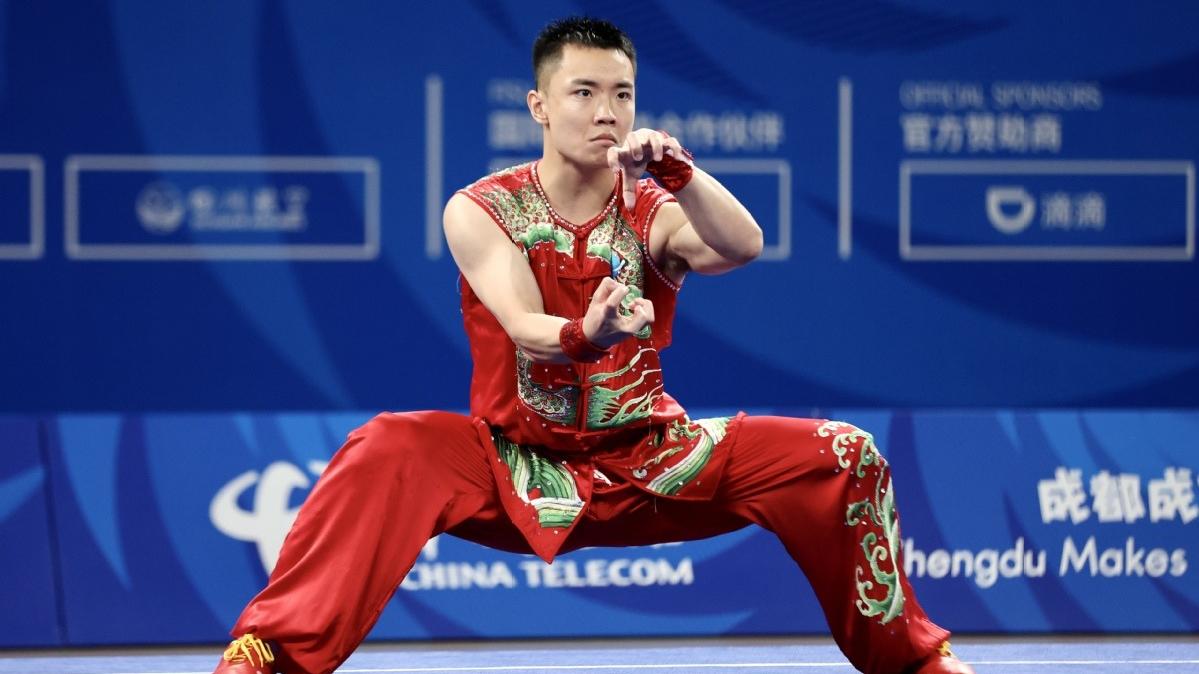 Cao Maoyuan wins the first gold medal at the 31st FISU World University Games with victory in the Men's Nanquan of Wushu tournament in Chengdu, on July 29. (WEI XIAOHAO / CHINA DAILY)
Cao Maoyuan wins the first gold medal at the 31st FISU World University Games with victory in the Men's Nanquan of Wushu tournament in Chengdu, on July 29. (WEI XIAOHAO / CHINA DAILY)
Dressed in a red outfit embroidered with green dragons, Chinese wushu athlete Cao Maoyuan realized his dream of becoming an international champion by collecting two titles at the Chengdu FISU World University Games.
The 25-year-old, however, fosters a bigger dream — to let more people around the world learn about this traditional Chinese martial art.
On Saturday morning, Cao stole the show with his dazzling and powerful nanquan (southern fist) performance to grab the first gold medal of the Chengdu games. Lau Chi Lung of Hong Kong, China came second and Shahin Banitalebi of Iran took bronze.
On Sunday, Cao claimed his second title, in nangun (southern staff).
ALSO READ: Universiade Day 1: China wins 4 Wushu titles, including 1st gold
After debuting in 2017, this is the second time that wushu has been an official medal event at the FISU games.
I hope they can join us to make wushu more popular in the world. With interest in traditional culture growing in recent years, many young Chinese students have taken up wushu.
Cao Maoyuan, Chinese wushu athlete
Wushu, or kung fu, is a collective term for martial art practices which originated in China.
Wushu features two main categories — taolu (routines competition) and sanda (Chinese kickboxing). Athletes from 31 countries and regions are competing for a total of 20 titles in the two categories in Chengdu. Eight athletes are representing Team China across 12 events.
The Chengdu games give this Chinese martial art a global platform and allow more young people around the world to see, learn about and practice wushu, according to Cao, who studies at Chengdu Sport University.
READ MORE: Chinese wushu athlete claims first gold at Universiade
"I hope they can join us to make wushu more popular in the world. With interest in traditional culture growing in recent years, many young Chinese students have taken up wushu," Cao said.
"Through the games, they can see that they have many foreign peers and wushu is also popular in other countries," he added.
Cao, a native of Sichuan, was born in a village in Weiyuan county, Neijiang city in 1997. He became interested in wushu at a very young age and often practiced by himself after watching kung fu movies and TV dramas, his mother Tang Rong recalled.
At the age of 5, he started to learn wushu at a local amateur sports school.
"When I was a boy, I dreamed I could be a master of martial arts, leaping onto roofs and vaulting over walls," he said.
Cao's father is a truck driver. One day while accompanying his father to fix his truck, he came across a boy in a garage who was practicing wushu, which initially piqued his interest in the martial art. Supported by his parents, Cao went on to learn wushu in a sports school in the county.
READ MORE: Universiade day 2: China tops medal table with nine-gold rush
The school was far from his home, so he had to take a bus every day to attend classes. During his time there, Cao transformed from a chubby boy into a fit and lean teenager, with the coach identifying him as a special talent.
Cao's parents decided to move nearer the school to support their son. But with their low income, they could only afford to rent a small house, and they moved around frequently.
Their sacrifices paid off when a 6-year-old Cao won a bronze medal in his first competition.
Five years later in 2007, Cao won his first title in changquan (long fist) at Sichuan Wushu (Taolu) Tournament, despite sustaining a head injury that required 13 stitches a day before the contest.
In 2008, he was called up to the Sichuan provincial wushu team.
"Cao is a talented and hardworking athlete," said Yu Bo, the coach of the Sichuan team. He noted that Cao usually has the highest "fatigue score" in the group after training — a testament to his dedication and hard work.
After winning nanquan and nangun at the national trials for the Chengdu games in 2021, Cao was determined to repeat the double at the World University Games.
"The opponent is always myself and I have to surpass myself every day," he said.


